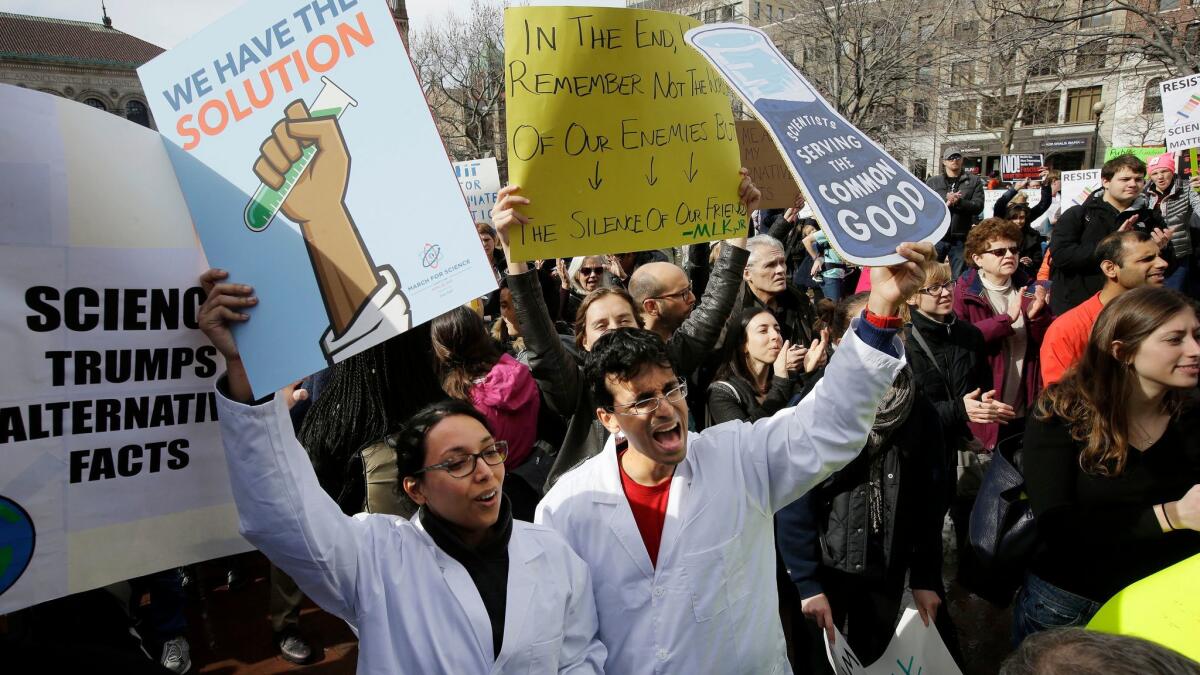Why L.A. scientists plan to march on Saturday

- Share via
The March for Science is kind of a funny thing.
The organizers insist that the event will be nonpartisan. But it will feature many of the trappings of a political march — signs, chants and speakers riling up the crowd.
The situation presents a quandary of sorts. Being a scientist requires objectivity. Bias of any kind is not acceptable.
With that in mind, is it OK for scientists to march and make a public statement — even if it is in defense of their work?
It’s a legitimate question, said Alex Bradley, a PhD candidate in molecular biology at UCLA who was instrumental in organizing Saturday’s march in Los Angeles.
Luckily, he said, it has an easy answer: Standing up for science is OK.
“We’re not lobbying for any specific policies,” Bradley said. “We’re just asking that policymakers consider the available evidence before making decisions.”
We’re just asking that policymakers consider the available evidence before making decisions.
— Alex Bradley, PhD candidate in molecular biology at UCLA
The March for Science in Los Angeles will begin at 11 a.m. Saturday in Pershing Square, after an hour of speeches to rally the crowd. Participants will walk about seven blocks to City Hall for more speeches, then return to Pershing Square for presentations on air quality, dinosaurs and how to spot “alternative facts” on the Internet.
Similar marches will occur in more than 500 cities around the world, including more than 40 in California.
Dianne Newman, a Caltech microbiologist who recently won a MacArthur Fellowship grant, is planning to march. But the decision to join a public protest wasn’t an easy one.
It felt awkward at first, she said. But the more she considered it, the less conflicted she became.
“At the root of every scientist is the respect for truth above everything,” said Newman, who joined the Women’s March in January and then a campus rally in March to show support for immigrants. “That’s what defines us. If we don’t speak out now, when would we speak out? It’s about respect for the truth. It’s the truth that counts.”
Sean Carroll, a theoretical physicist at Caltech who is scheduled to address the marchers in downtown Los Angeles on Saturday, said he sees the event as an occasion to remind people that science has a lot in common with democracy.
“They share some DNA,” he said. “In both spheres anybody can be wrong and nobody has all the right answers. You can be the lowest graduate student in science, but if you do an experiment that shows Einstein was wrong, you win. Similarly in a democracy there is no philosopher king — no one person who should be in charge.”
Geneticist Maria Elena Zavala of Cal State Northridge said that to her, marching for science also means marching to protect disenfranchised people who will probably be the most affected by cuts to federally funded research and the rollback of environmental protections, both of which President Trump has advocated.
“Think about who is downstream from that,” she said.
Zavala, who will also address the crowd on Saturday, said she worries that the consequences of decisions being made now will be felt for years to come.
“I’m marching for now and I’m marching for the next generation of scientists,” she said.
Will you be marching on Saturday? I’ll be at the March for Science in Los Angeles and I want to talk to you about why you’re there. Follow me @DeborahNetburn and look for me in the crowd.
MORE IN SCIENCE
How L.A.’s March for Science came to be
Scientists get a rare view of a type Ia supernova magnified 50 times
Can scientists rejuvenate an aging brain with a protein found in umbilical cord blood?







